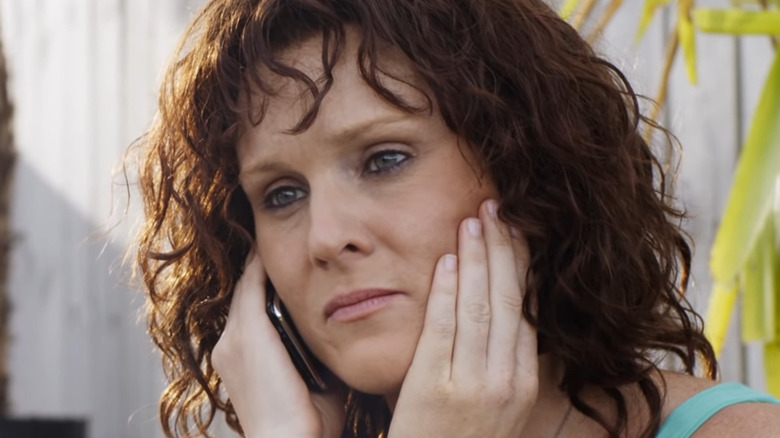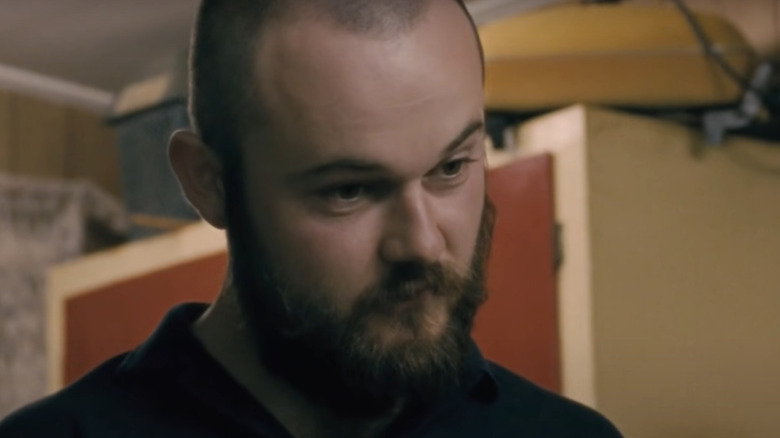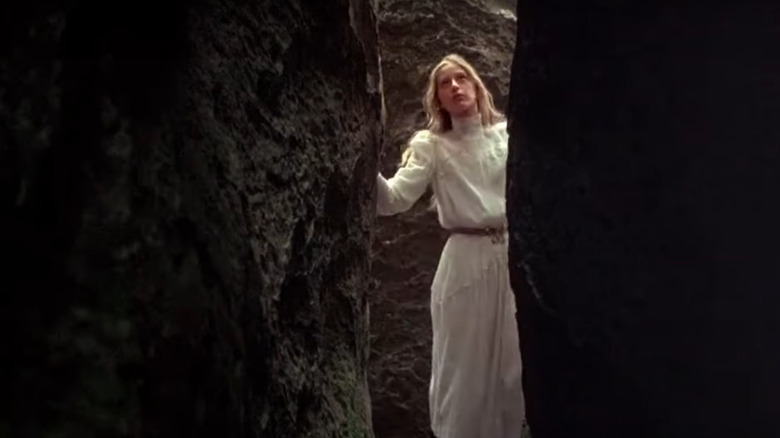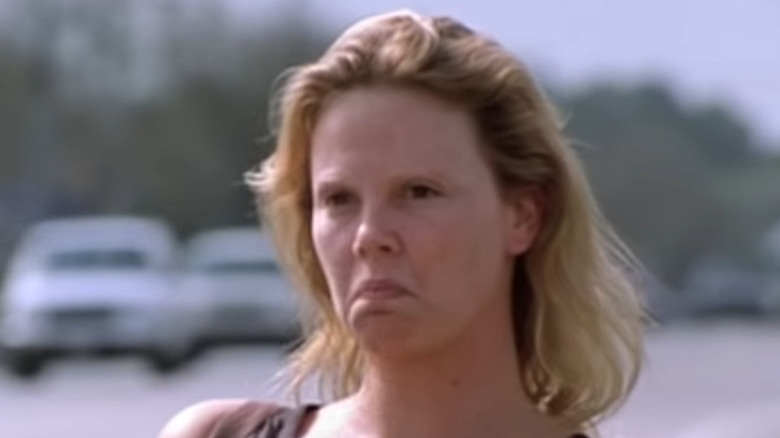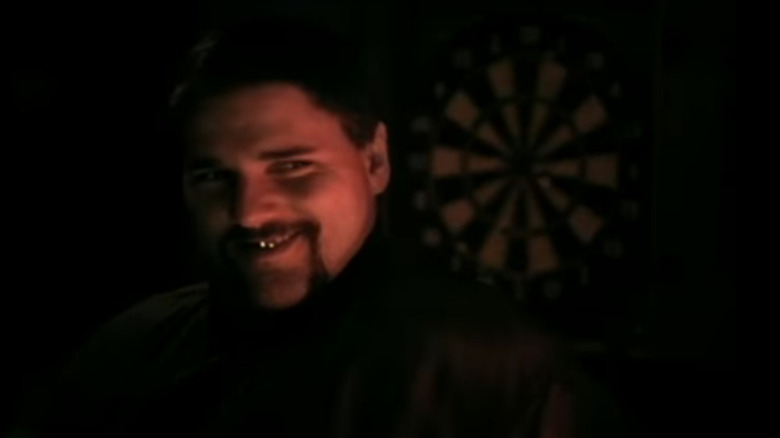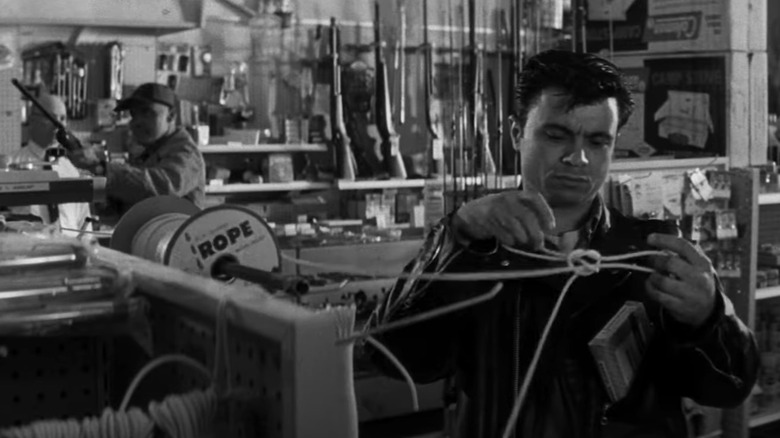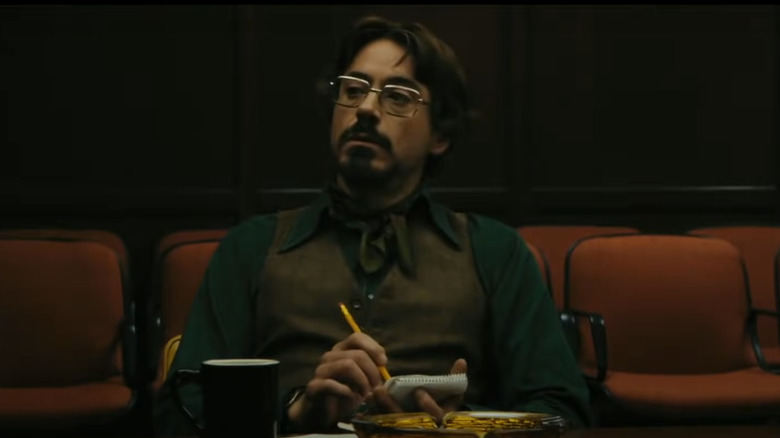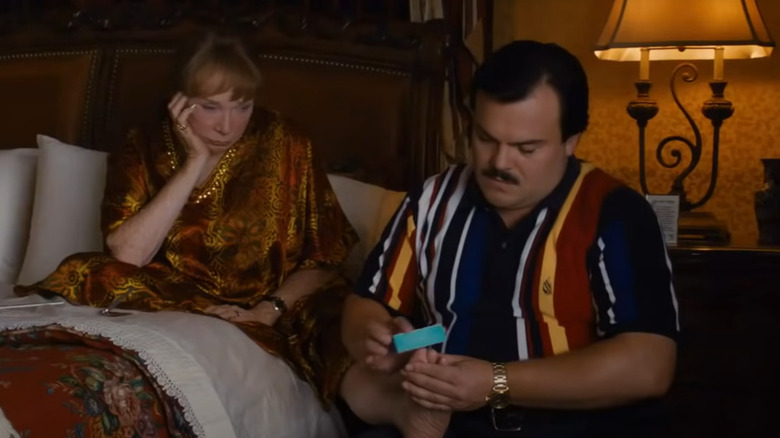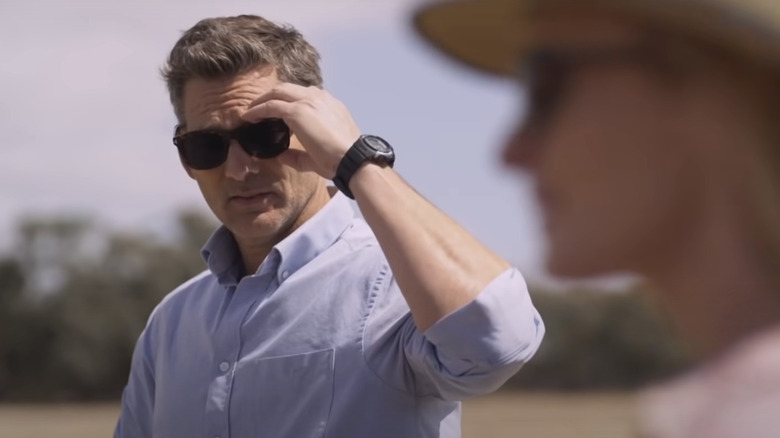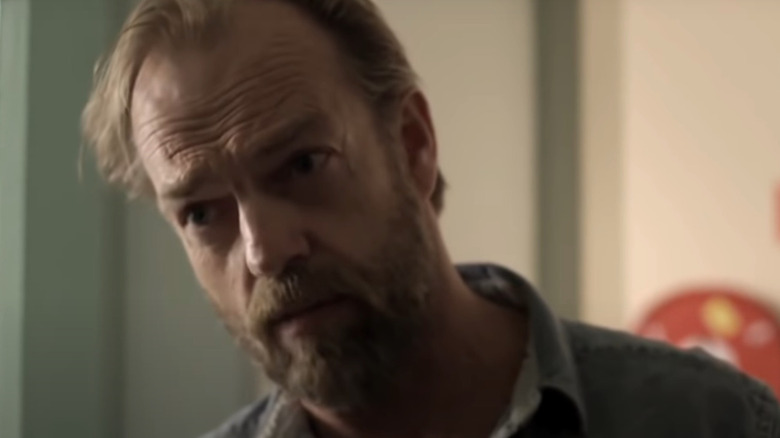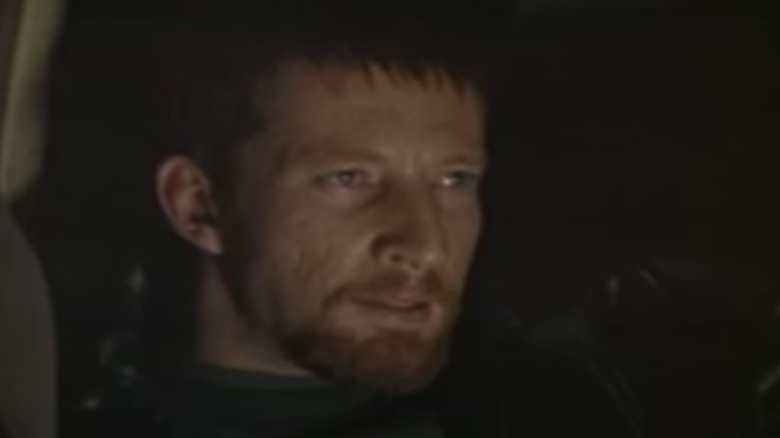10 Movies Like Catching The Black Widow If You Love Crime Dramas
The 2017 film "Catching the Black Widow" — a dramatized retelling of a real murder and its subsequent investigation that took place in New Zealand in 2009 — is the harrowing tale of a woman who sets out to bring her brother's killer to justice. The catch is her brother was murdered by her sister-in-law. Aidee Walker plays the film's protagonist, Lee-Anne Cartier, and Katherine McRae gives a subtly creepy performance as Helen Nisbet, the titular Black Widow.
While the subject matter is wild, writer-director Thomas Robins wisely plays the material straight. He lets the heinous details of the real-life New Zealand murder case speak for themself. There are no major fisticuffs or speechifying on display here, just the haunting facts of a spousal murder made to look like a suicide. It's the rare made-for-TV movie that merits multiple watches and doesn't rely on melodrama. So here is a list of ten movies that tell similar stories for fans of "Catching the Black Widow" looking to go farther down the crime drama rabbit hole.
The Snowtown Murders
The first entry on our list is Justin Kurzel's directorial debut, "The Snowtown Murders." Like "Catching the Black Widow," this film is a dramatized retelling of a real-life murder. Unlike "Catching the Black Widow," Kurzel's movie is more concerned with the murders and their perpetrators than the investigation. There's also not a single ounce of optimism in "Snowtown" — viewers be warned.
The movie charts the actions of the worst serial killers in Australian history from the perspective of Jamie Vlassakis. The beginning of the film wastes no time introducing audiences to Jamie's abusive home life and quickly paints a picture of Jamie's struggles in the blue-collar suburb of Adelaide he calls home. Things just get worse when his mother's new boyfriend, John Bunting, moves into the house.
Describing what transpires after Bunting moves into the Vlassakis home wouldn't really spoil any of the story's twists, as it's a matter of Australian public record that Bunting recruited Jamie and a man named Robert Wagner to kill 12 people. However, it would ruin the way Kurzel chooses to capture the story. The film was divisive with audiences upon release; critic Lou Lumenick called certain sequences "unwatchable" in his New York Post review, but critic Roger Ebert awarded the movie three and a half out of four stars.
Picnic at Hanging Rock
Peter Weir's "Picnic at Hanging Rock" — based on the 1967 novel of the same name — is an all-time favorite of the cult movie crowd. The movie, set in Australia at the turn of the 20th Century, depicts the disappearance of several schoolgirls and their teacher during a field trip to the titular rock. While this may sound like a run-of-the-mill missing person movie, its unique style makes it anything but by the numbers.
Weir's direction creates a dense mood and an atmosphere that is simultaneously intriguing and frightening. While Weir's approach is magnificent, it's not the only reason crime fans will enjoy a trip to Hanging Rock. The film's unconventional narrative, rooted in a lack of explanation, remains as original today as it was when it was first released. It's hard to say too much more without giving away the movie's best surprises, but the film effectively captures the sense of dread created by the unknown.
Elle Australia notes that "Picnic at Hanging Rock" uses a fake "based on a true story" title card to frame its narrative. This framing device makes the film an interesting watch for fans of true crime dramas like "Catching the Black Widow." Thanks to this unique approach, the story is presented as if it were real and provides audiences with the same thrills offered by the best true crime stories.
Monster
2003's "Monster" not only announced the arrival of directing talent Patty Jenkins but also allowed Charlize Theron to deliver on her promise as a screen actor. In the movie, Theron plays Aileen Wuornos, a street prostitute turned serial killer. Aileen was at large from 1989 to 1990 and murdered seven people during that time. The film follows Aileen throughout her spree of murders and tracks her relationship with Selby Wall (a stand-in for Aileen's real-life companion Tyria Moore).
Jenkins — who'd later go on to direct "Wonder Woman" — wisely doesn't judge her film's characters. Instead, Jenkins simply rolls tape on the action as it unfolds and trusts the audience will understand the extreme awfulness of Aileen's crimes and the circumstances which lead to them. Pair this approach with an incredible performance from Theron and audiences get a movie that critic Roger Ebert called "the best film" of 2003 in his review.
While the movie stands apart from something like "Catching the Black Widow" because it follows the criminal instead of her pursuers, fans can appreciate their similar styles. Both movies approach their material by letting the heinous nature of their events speak for themselves.
Chopper
Andrew Dominik's directorial debut depicts the dastardly life and times of Australia's most notorious criminal turned author: Mark "Chopper" Read. Eric Bana, in the leading role, is nigh-unrecognizable. He portrays Chopper as a human being with a seemingly bottomless amount of contradictions.
Chopper is a desperate hard man who often looks confused, confounded, and stupefied by the consequences of his violent actions. The events of his life are stranger than fiction. Eventually, he puts them on paper to become one of Australia's best-selling authors. Fans attracted to the surprising details presented in "Catching the Black Widow" will enjoy the jaw-dropping ins and outs of Chopper's life. While "Chopper" isn't a mystery, it delves straight into human behavior that's foreign to most people.
Director Dominik ensures Chopper is never presented as a career criminal. Unlike biopics about notorious gangsters or the law agents who catch them, Dominik un-romanticizes the myth surrounding its subject. Within the lens of his camera, Dominik makes Chopper an unrelenting psychopath who flies into violent rages and winds up isolated because of it. It's a masterclass in all the ways a director and an actor can create sympathy for a challenging character without glorifying their misdeeds that earned wide praise from critics. Come for the story, stay for the world-class direction, and be prepared to be blown away by an astounding performance.
In Cold Blood
"In Cold Blood," based on arguably one of the best known true crime stories ever told, recounts the harrowing 1959 murder of the Clutter family. The details of the murder, subsequent investigation, and trial were brought to national attention in 1966 by author Truman Capote. His book was and remains enormously popular, as The Guardian observes, even though its subject matter is so grim. In 1967, director Richard Brooks — who famously helmed adaptations of other American literary works like "Cat on a Hot Tin Roof" — brought the Clutter family murder to theaters across the country.
Fans of the soup to nuts meticulous retread of events seen in "Catching the Black Widow" will enjoy the straightforward nature of Brooks' film. Brooks frames the story through flashbacks to connect all of its separate threads and maintains a real-life hum throughout the film. Famed critic Roger Ebert noted the film's naturalism, saying the performances "have the flat, everyday, absolutely genuine ring of truth to them." The actors portraying real-life murderers Perry Smith and Dick Hickock — played by Robert Blake and Scott Wilson, respectively — do phenomenal work playing the two killers. Their performances are so measured that they wind up being disturbingly realistic.
Performances like these provide an answer to the question of why movies like "In Cold Blood" and "Catching the Black Widow" are so effective — they bring the unimaginable to theaters and living rooms the world over.
Zodiac
In 2007 director David Fincher — of "Fight Club" and "The Social Network" fame — brought the real-life Zodiac Killer saga to the big screen with "Zodiac." And boy, did Fincher bring it, as "Zodiac" is a modern masterpiece. It's technically brilliant, the performances from its stacked cast — including Jake Gyllenhaal, Robert Downey Jr., and Mark Ruffalo — are all exceptional, and tension oozes out of the screen.
For anyone unfamiliar, the Zodiac Killer plagued California in the late 1960s. He wrote letters with cryptic codes to news outlets, claimed responsibility for multiple murders, and disappeared without ever being caught. While the story is terrifying enough in its own right, through Fincher's lens the movie becomes not only a true crime story but also a meditation on obsession and confronting something you can't understand.
Fans of Lee-Anne's strength of will during her investigation in "Catching the Black Widow" will admire the doggedness driving the various cops and journalists seen in "Zodiac" attempting to solve a puzzle without all of its pieces. However, unlike Lee-Anne, the driven investigators don't find anything conclusive. They find plenty of evidence, but never enough to get their man. This, in an odd way, is why "Zodiac" is so compelling as crime fiction.
Like Fritz Lang's "M" before it, "Zodiac" shows its audience how inexplicable evil — like serial murder — impacts and changes institutions. Fincher asks what happens when the unexplainable remains unexplained. In his hands, the answer is discomforting and awesome to behold in equal measure.
Bernie
Director Richard Linklater delves into a murder mystery in this next entry, 2011's "Bernie." The movie — based on a murder committed in Carthage, Texas in 1996 — stars Jack Black, Matthew McConaughey, and Shirley MacLaine. Black portrays real-life murderer Bernie Tiede, a beloved member of a small-town community who winds up being emotionally abused by the elderly millionaire Margie Nugent, played by MacLaine.
In the movie, as in real life, Bernie eventually murdered his older charge and then proceeded to give her wealth away to other members of their small town. The movie's hook has two prongs. The first is the question of exactly how Bernie got caught, while the second is interest in seeing Jack Black play a murderer.
To the comedian's credit, he brings his A-game and makes Bernie out to be oddly charming even while he suppresses a simmering internal rage. Roger Ebert praised the performance, stating that the actor's characterization made him "forget what I knew about Black." Linklater — best known for fun movies like "Dazed and Confused" and "School of Rock" — frames the film like a documentary. Fictional talking segments do a great job of highlighting the absurdity at the heart of the story.
Anyone who was drawn to "Catching the Black Widow's" almost unbelievable central story will definitely enjoy the factual absurdity of "Bernie."
The Dry
2021's "The Dry" is another excellent murder mystery from Australia. The movie, which stars Eric Bana and is directed by Robert Connolly, adapts author Jane Harper's novel of the same name. In the film, Bana plays Federal Agent Aaron Falk. The story follows Falk's return to his hometown for a funeral. However, this being a murder mystery story, fans may not be surprised to find out Falk's trip home results in him undertaking a homicide investigation.
Bana shines in a performance that Variety critic Richard Kuipers called "spot-on" in his review. The movie's structure — the main storyline is intercut with flashbacks of Falk's adolescence — leaves nice bread crumbs for major payoffs and reveals in the third act. The movie's setting in the desolate Australian outback also allows for gorgeous cinematography and an ever-present sense of dread. In a place where the environment is deadly enough, it's fairly terrifying to consider there may also be a killer on the loose.
While "The Dry" isn't based on a true story like "Catching the Black Widow," it's worth checking out for fans of Aussie cinema and stories about murderous families.
Mystery Road
When detective Jay Swan returns to his small town to join its police force as a detective in "Mystery Road," he comes face to face with two brutal things. The first is a nefarious human trafficking scheme. The second is his new police department's deep-seated systemic racism against Australian Aboriginals. While the movie is not based on a real case, fans of "Catching the Black Widow ” will appreciate the care the film takes to ground its fictitious investigation into real-world issues.
Aaron Pedersen brings real-world authenticity to the role of Jay Swan, which could've easily slipped into a grizzled detective cliche. Hugo Weaving, who appears as Swan's condescending co-worker Johnno, is clearly having a ball playing a character whose motivations are muddled. However, the actors — good as they are — are outshined by the movie's script, which received extensive critical praise. Writer-director Ivan Sen's well-crafted script places the audience in the front seat of Swan's investigation. The viewer rides shotgun with Swan for every discovery, twist in the case, and roadblock the detective encounters. All of this equates to a movie that feels like "Chinatown" in the Outback. Crime lovers should run, not walk, to check out this hidden gem.
The Boys
1998's "The Boys" is a spellbinding dive into evil. Directed by Rowan Woods and featuring a breakout performance from David Wenham — best known for playing Faramir in "The Lord of the Rings" franchise — "The Boys" sits its audience on the couch next to the violent men at the center of its story. Wenham plays Brett, a man recently released from imprisonment for assault. The movie, set in a working-class suburb outside of Sydney, Australia, follows Brett as he reunites with his brothers and eventually leads them to commit a terrible, random act of violence.
While a flash-forward framing device clues the audience into the brothers' impending crime at the beginning of the movie, most of the film watches Wenham and his brothers interact. If this seems like a rather theatrical way to stage a crime drama, it is. The movie adapted a play by Gordon Graham which The Guardian notes was loosely inspired by the real-life 1986 murder of Anita Cobby.
Unlike other entries on this list, "The Boys" avoids the usual crime drama trappings. It trades investigations and court proceedings to make an argument that evil can come from anywhere, including a sleepy suburb. For anyone interested in more small-town villains like Helen from "Catching the Black Widow," "The Boys" is the portrait of evil's mundane origins for you.
